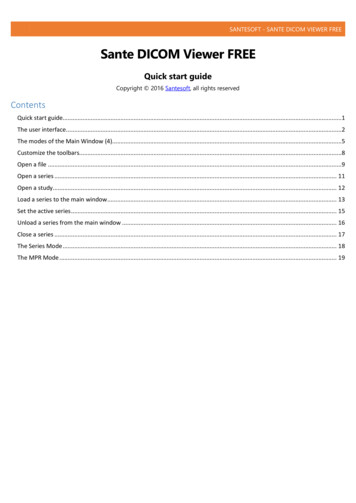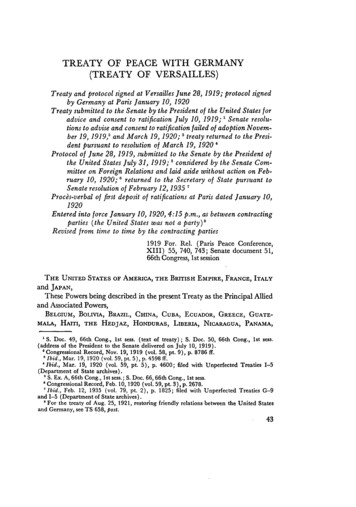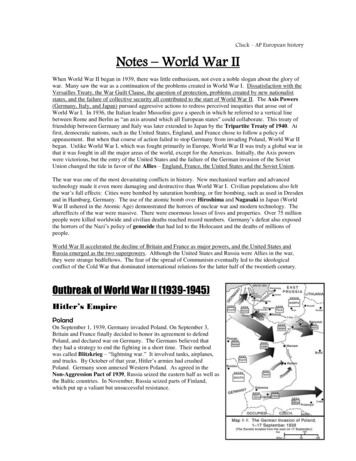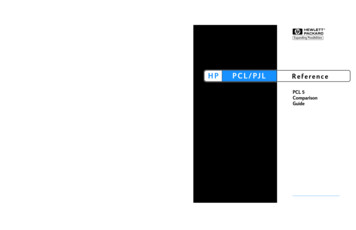
Transcription
1Versailles Series 1Press Pack10 X 52 minute episodesCreated by Simon Mirren & David WolstencroftDirected by Jalil Lespert, Christoph Schrewe, Thomas Vincent and Daniel RobyExecutive Producers: Claude Chelli, Anne Thomopoulos, Simon Mirren & David WolstencroftAssociate Producer: Aude AlbanoProducers Canada: Jean Bureau and Ian WhiteheadA Canal Original CreationProduced by Capa Drama, Zodiak Fiction and Incendo
2CONTENTSSeries Information – Page 3Character Descriptions – Page 4Interview with Simon Mirren and David Wolstencroft, creators of Versailles – Page 7Interview with George Blagden (King Louis XIV) – Page 9Interview with Elisa Lasowski (Queen Marie-Thérèse) – Page 11Interview with Alexander Vlahos (Philippe) – Page 13Interview with Sarah Winter (Louise de La Vallière) – Page 15Interview with Jalil Lespert, director of episodes one and two – Page 17Drama is all About Perspective, by producers Claude Chelli and Aude Albano - Page 20A note on Versailles from Canal Plus – Page 22Versailles Series 1 cast and production credits – Page 23
3Series InformationVersailles, France, 1667.Louis XIV is 28 years old. He will soon be recognised as the greatest of kings. A brilliant politicalstrategist, Louis is haunted by the trauma of The Fronde, a bitter civil war in which the nobilityrebelled against the crown. Determined to bring his rich courtiers to heel, and establish his absolutepower, he devises an elaborate Machiavellian plan. He intends to transform his father’s huntinglodge into the most magnificent château in Europe, The Palace of Versailles.As well as protecting him, and providing a lavish setting for romance, it will keep the nobility awayfrom Paris. They will realise too late it is a gilded prison. They are under the control of a mastermanipulator. Historical and fictional characters – flamboyant nobles, beautiful courtesans andhumble servants guide us through this intoxicating world of secrets, betrayals, love and war. This isVersailles in all its brutal glory.Episode 1France, 1667. Proud young King Louis XIV seeks to stamp his authority on court and country, butfaces resistance and betrayal, even from those closest to him. Shifting the seat of power to aluxurious rural ‘lodge’ that he plans to enlarge only adds to his problems.Episode 2Harsh steps must be taken to preserve the royal reputation, while flamboyant Philippe causes a stirof his own. The King hopes that humiliating a suspect noble will bring others to heel.
4Character DescriptionsKey Historical CharactersKing Louis XIV played by George BlagdenAt 28 years old, King Louis XIV of France is in sole command of his kingdom, following the death ofhis mother, Anne of Austria. Louis is a spirited and seductive man, an extraordinary strategist and anutterly ruthless statesman. He is haunted by childhood memories of a bitter coup, ‘the Fronde’,when the nobles attempted to overthrow his father, Louis XIII. Louis has a dream, an obsession: tobuild the most beautiful palace in all of Europe – Versailles. Symbolising all the splendor and glory ofFrance, it is a place where he will be safe at last. The nobles crave entry to this lavish château, but itspurpose is to imprison and control them. Versailles sees Louis XIV grow from a young King into anall-powerful absolute monarch.Philippe, Louis' brother played by Alexander VlahosLouis’ younger brother Philippe, known as Monsieur, is a free spirit, an effeminate dandy and aferocious warrior. To prevent him from overshadowing his brother, their mother raised Philippe as agirl and worked to curtail his natural leadership talents. A lover of art and beauty, Philippe walks thegardens of Versailles dressed as a woman and willingly submits to the sexual whims of his lover,Chevalier de Lorraine. On the battlefield, he is a formidable soldier, able to win the support of entireregiments. This does not fail to arouse immense jealousy in his brother. To further complicatematters, Philippe’s neglected wife, Henriette, finds herself in Louis’ arms.Henriette, Philippe’s spouse played by Noémie SchmidtSister of King Charles II of England, Henriette, known as Madame, is the wife of Philippe and themistress of King Louis. Henriette fulfills her duties with grace and elegance. A delicate English rose,fully aware of her dynastic obligations, she is a cunning politician and a force to be reckoned with.Abandoned by her husband and mistreated by Chevalier, she gradually loses the heart of Louis, whois under the spell of the sublime Madame de Montespan. Desperate to secure the love of her life,
5she agrees to become a pawn on the political chess board, sealing the secret Treaty of Doverbetween France and England such is the price of maintaining her position.Marie-Thérèse, The Queen played by Elisa LasowskiMarie-Thérèse is King Louis’ Queen. Desperate to win back the love of her husband, she has to besatisfied by the regularity with which he performs his conjugal duties, even having spent the eveningwith a more entertaining mistress. Marie-Therese is docile and pious. Her rigid Spanish educationmeans she has few friends. An isolated, tragicomic character, she uses what others mistake forstupidity to hide her most intimate secrets.Chevalier, Philippe's lover played by Evan WilliamsChevalier, Philippe’s male lover, is as handsome as he is toxic. Petty and manipulative, he is theperfect conspirator. He enjoys controlling his lover and constantly belittling his rival, Henriette.Louise de La Vallière played by Sarah WinterLouis’ mistress for many years, Louise de la Vallière feels she is gradually losing the King’s heart yetshe still loves him. Louis knows she is the only woman to ever love him for what he is, not for hiscrown. Louise knows that her adulterous relationship with the King, and the child she secretly bears,will be severely condemned by the church. The shy pregnant mistress becomes a penitent martyr.She begs the King to grant her exile from the court so she can seek refuge in a convent and reconcilewith God.Madame de Montespan played by Anna BrewsterMadame de Montespan is witty, graceful and probably the most ambitious woman at the court ofVersailles. Married to the jealous Marquis, and lady-in-waiting to the powerful, she uses her positionand her talent for repartee to reach her ultimate goal: Louis. 1667 will be the year when all her hardwork finally pays off.Rohan, Louis’ childhood friend played by Alexis MichalikRohan is Louis’ childhood friend. A notorious womaniser and talented warrior, he always cultivated acompetitive relationship with his royal companion. Behind the friendly face there’s a much darkerside to Rohan. Once denied a seat at the court by Louis, he returns harbouring extreme feelings ofresentment and contempt.Bontemps, Louis’ First Valet and Governor of Versailles played by Stuart BowmanBontemps is the warm and friendly Governor of Versailles. He considers it his duty to defend theKing against all those who try to get near him. A rich man who sleeps each night at the foot of hismaster’s bed, he is the closest person to King Louis. As such, his loyalty is tested daily.Anne of Austria, Louis’ mother played by Dominique BlancAnne of Austria brought up her son to become the greatest King of all. Though deceased, she liveson in Louis’ dreams and memories. Like having Machiavelli on his shoulder, she whispers advice, butsoon the King will reject this ghost from his past.
6Key Fictional CharactersFabien Marchal, Chief of Louis’ Police Force played by Tygh RunyanFabien is the leader of King Louis’ Stasi-like police force. Officially reporting to Bontemps, Fabiensometimes receives his orders directly from the King, when Louis has needs he knows Bontempscannot fulfill. Fabien is terrifying not only because of his intimidating physique, but because of hischilling eyes that see everything. He is a solitary man, emotionless it seems until he meets Beatrice.Béatrice, Chevalier’s cousin played by Amira CasarBeatrice is a penniless widow who tries everything to get closer to her distant cousin, Chevalier, whoshe plans to use as a springboard to wealth and stature. Her trump card in this quest is her beautifuldaughter, Sophie, “the fairest of all” at the court of Versailles. Beatrice is a secretive andmanipulative woman. Fabien, blinded by passion, does not realise at first the true nature of hissulphurous conquest Sophie, Beatrice’s daughter played by Maddison JaizaniSophie, the beautiful daughter of Beatrice, is 16 years old. She is a girl full of dreams, an ingénue outto enjoy life and follow her passions. However, her mother has other plans for her – a strategy toensure her daughter achieves a privileged rank in the court, with a place alongside the King. Soon,Sophie discovers that the glitter of Versailles hides a cruel and violent world where one mustabandon candor in order to survive.Montcourt played by Anatole TaubmanMontcourt is a noble who took part in the rebellion against Louis’ father. An early victim of the GreatInquiry, Louis makes an example of him in front of the whole court. Montcourt turns bandit anddiscovers a whole new world of smuggling and violence. Recognising Montcourt’s thirst for revenge,Cassel entrusts him with an important mission: to destroy the Versailles project.The Duke of Cassel played by Pip TorrensCassel is the rich and powerful Duke of Northern France. He doesn’t need anyone or anything leastof all a young king determined to set new rules. He refuses to acknowledge the Great Inquiry, tosubmit proof of his nobility or even to listen to the King’s messengers. He might be charming, butCassel is also a skilled manipulator. He uses all means necessary to prevent Louis’ new order frombecoming a reality, including sabotaging the construction of Versailles.Masson, the King’s Doctor played by Peter HudsonThe local medic, Masson is abruptly promoted to royal physician, a key role at court. He is a nervousman, as panicked as he is honoured by his responsibilities. Together with his daughter, Claudine, hetakes us behind the scenes at Versailles. Masson believes in 17th century medicine and wishes aboveall else to see Claudine happy and safe but she is getting ever closer to the King.Claudine, Masson’s daughter played by Lizzie BrocheréClaudine is a modern woman trapped in the 17th century. Brought up by her father to observe andquestion the world, she refuses to marry for money. Her passion is medicine and, because thisdiscipline is closed to women, she secretly develops her skills while working as a midwife. As shegains closer access to the King, the arguments with her father intensify. Their visions of medicineconflict and Masson can’t stand the humiliation.
7A Universal Storyby Simon Mirren and David Wolstencroft, Creators of VersaillesWhat are two UK writers doing writing a show in English about a French king? The answer is verysimple: Apple. The world knows what Steve Jobs did by building Apple into a force around the globe,but few know that without Louis XIV and Versailles, none of what we are witnessing today would bepossible.Versailles was the Apple of its day, the world’s first truly global brand. Great stories are a globallanguage and there are few greater or more all-encompassing than the story of Versailles.The Chateau de Versailles and the court of Louis XIV are part of the unshakeable bedrock of Frenchhistory. For a moment, we admit, we were more than a little nervous of committing to the project,since we knew all too well what the French might think of seeing their historical legacy outlined inAnglo-Saxon idioms.But then we did something that is very useful in most circumstances. We stepped back, gained alittle context, and remembered that Louis’ grandmother was a Medici, that his queen, MarieTherese, was Spanish, that his sister-in-law, Henriette, was an English princess. That’s when it hit us:The story of Versailles isn’t just a French story or even a European story, it is universal.For many of us, the first stories we were ever told featured a king in a castle in the middle of a forest.For us Versailles, while rooted deeply in French patrimonie, is a universal tale of the need for powerand the need for control.When we approached the story of a young monarch centralising his power, we knew it was also thestory of a young man attempting to conquer his demons and grasp some form of control over his life.We felt it would be intoxicating to see him battle these forces and succeed. We are, all of us, tryingto build something, after all.Reading the history books it is easy to assume that Louis’ absolute power was wielded the momenthe became King, that this was his birth right, ordained by the chronicles. In our opinion, this is farfrom the truth. His central transformation from a figurehead into a CEO is a fascinating study in whatpsychologists might call “ruthless dominance”, a project of sheer force of will that was foreverpoised on the brink of failure.Louis is still at this stage, one year after the death of his beloved but controlling mother, a manplagued by insecurity and flux in stormy and unsettled times. There was no telling which way hisdestiny would go. It was entirely up to him to seize his destiny from the ministers who hadcontrolled him throughout his regency. In doing this, in many ways, he was moving from childhoodto adulthood.
8Our first season sees his coming of age of a monarch. As writers we have had many years ofexperience working on shows that have featured criminal psychopathology and other disorders ofthe brain. Thus we always saw the architecture of this show as inextricably linked to the architectureof Louis’ young mind - ambitious, traumatised, paranoid, borderline sociopathic and evenpsychopathic at times.The palace of Versailles is, in many ways, a map of the mind of a monarch. The establishment ofVersailles as a centre of power away from the past, in Paris, was a masterstroke of realpolitik, asinnovative, intelligent, modern and provocative as Louis XIV himself. What Louis created was not justa palace. It was a great cornerstone of culture, fashion, cuisine, as well as the secret police.But it wasn’t just Louis who held our attention. His brother Monsieur, Philippe Duc d’Orléans,seemed to us an extraordinary and uniquely modern character hiding in plain sight. He won us overcompletely. We’d simply never seen a character like him before, an openly gay warrior, a championof the arts, a huge influencer of taste and fashion, in thrall to his lover (the manipulative Chevalierde Lorraine), a man who was forever in the shadow of his older brother.Louis’ enmity with his brother remains front and centre to our drama. Monsieur is a vastcontradiction of willing passivity, bottled rage and, like his brother, sexual appetite. Between themsits Henriette d’Angleterre, the sister of an English king, one of the beauties of the age, Monsieur’swife and, we postulate, Louis’ lover. This was a triangle we wanted to explore for 100 episodes!Enraged by his brother’s affair with his wife, he nevertheless continues his own homosexual affairwith the Chevalier de Lorraine, and attempts to maintain control over Henriette through multiplepregnancies and psychosexual abuse.History is told by the winners and the majority of the stories that remain have been controlled insome way. What pressures lie behind them? In whose interest were they written? What we know ofhistory is merely the tip of the iceberg. We wanted to write a redacted history of Versailles, theiceberg under the water and the intrigues have only just begun.Simon Mirren is a British writer and producer. He started his writing career with the 1999 movieG:MT - Greenwich Mean Time. He then worked as a television writer on numerous hit British series,such as Waking the Dead, on which he was also producer. He played a key role in the first two seriesof Spooks (BAFTA for Best Drama Series in 2003), on which he was responsible for the researchwhich gave the show its authenticity. He created and produced the miniseries Deep Blue for Channel4 and in 2003, he moved to Hollywood where he worked as a writer for the series Without a Trace.He then joined the writing team of Third Watch, before working for six years on the series CriminalMinds, of which he became showrunner. He is also showrunner for the series The Sector, producedby Scott Free (the production banner of Ridley and the late Tony Scott) for cinemax.David Wolstencroft is a multi-award-winning British writer and producer. Born in Honolulu, Hawaii,he grew up in Edinburgh and studied at Cambridge, where he won the Edward Spearing Prize forhistory. His first work for television was the series Psychos (original idea and writer), which wasnominated at the BAFTAs and earned him the Network Newcomer Award from the Royal TelevisionSociety. He then wrote the spy series Spooks for BBC1, which won several BAFTAs, and on which hemet Simon Mirren. In 2013, the series The Escape Artist starring David Tennant was aired on BBC1and earned Wolstencroft a nomination for a BAFTA Scotland award for his writing. Wolstencroft alsowrote the screenplay for Shooting Dogs, the feature film directed by Michael Caton-Jones starringJohn Hurt and Hugh Dancy, which won the Grand Prix at the Heartland International Film Festival in2006.
9Interview with George Blagden (King Louis XIV)How did you prepare for the role of King Louis XIV?Quickly and in a panicked way! (laughs) I was cast about 4 weeks before we started filming and I wasshooting a different television series in Ireland at the time and I actually finished filming on thatseries on the Friday, came over to Paris on the Saturday for costume, hair, makeup and rehearsalson the Sunday, and then started filming Versailles on the Monday. So the joke is I had a weekend toprepare for the most powerful monarch in European history! Though I did as much research as Icould have done in those four weeks and I very much trusted in David and Simon’s writing. Knowingtheir vision for the show, I felt in very safe hands.Can you describe King Louis XIV’s relationship with his brother?Complex. I think it’s a real pillar for what drives the narrative of the show. I think that basicallyPhilippe’s character is a very, very interesting one which effects Louis greatly - and vice versa. I reallyenjoy watching scenes between them and seeing what happens behind closed doors with them. It’svery powerful, this brotherly relationship. You have lots of elements of love and hatred and angerand betrayal and I think Alex does an amazing job with Philippe. I really think when I’m doing sceneswith Philippe there’s this great chemistry that’s kind of accidental and I don’t think anyone foresaw.It allows for lots of unspoken understanding between me and him of how we’re going to portraythese brothers. In short I think he makes me look very good, and I’d like to hope to think that thereverse is the same and that when we’re on set together the relationship is very powerful.How about his relationship with his wife?It’s a very interesting relationship because it was an arranged marriage and they married when theywere teenagers I think. Of course it was a very political marriage to enable relations between Franceand Spain to go smoothly, and that as a starting point for a relationship can be quite difficult. I thinkthat of all of the women in Louis XIV’s life he has a great deal of respect for Marie-Therese and at nopoint does their relationship become jeopardised by this knowledge that they’re union was initiallyfor political reasons. They have become fond of one another as a result.What can BBC2 viewers expect from Versailles?
10They can expect lots! It’s very much an attempt from all of us to try and put a different light on thisperiod of history and show it in a way that really relates to a modern audience. I think the way thatwe’ve been able to play with the historical facts and put pieces in between those facts that are verydramatic and very human really means that the audience will be able to identify with this world andthese people. And everyone will have a different favourite character – there’s not one favouritecharacter that everyone will come away with from the show liking. It’s a real ensemble cast thatdelivers, in my opinion, a very powerful story.What were your highlights of shooting series 1?I don’t think I have an hour and a half to tell you! There were so many. There was one moment atthe start of series one – on our first day of shooting at the real Palace of Versailles, on a Mondaywhen it’s closed to the public. We had ten minutes at the end of the day and we really wanted tofilm this monologue of Louis talking to camera in The Hall of Mirrors. Almost a ‘Frank Underwoodfrom House of Cards’ vibe, but in a dream sequence envisaging what Versailles would one daybecome. We decided to have a go at recording it with ten minutes left of the day. I quickly went andchanged into this different outfit and came back out into the hall of mirrors with five or six minutesto shoot this monologue. At that exact moment the sun dropped down underneath the clouds andthis beautiful bright orange light flooded in through all of the windows into the hall, bounced off allthe mirrors and the room was just literally golden. It was on the 400th anniversary of Louis XIV’sdeath and it felt as if everyone in the room had this spine-tingling feeling of ‘Wow - we’re doingsomething quite special here”. I delivered the monologue - I had two goes at it - and it’s there forviewers to see in the final cut of episode 1. I think it doesn’t get much better than that as an actor.I’m just blessed to have been given an opportunity like this show.
11Interview with Elisa Lasowski (Queen Marie-Thérèse)Where do we find Queen Marie-Thérèse at the beginning of Versailles series 1?At the beginning of series 1 Marie-Thérèse is confined to a room, because she is pregnant. Back thenthis was the case with many women in the later stages of pregnancy to protect their unborn babyand to protect the woman too. So Marie-Thérèse is confined to a room at Versailles just about togive birth, and alongside this she has to endure living with the King’s mistresses. One of whom isLouise de La Vallière (played by Sarah Winter), who’s been the King’s mistress for at least a good sixyears at that stage and is also having children with him too. The baby Marie-Thérèse is about tohave is not her first, either – she’d had children with the King before this point.Could you describe Marie-Therese’s relationship with King Louis XIV (George Blagden)?Marie-Thérèse is the King’s cousin. They were cousins twice over actually – as both the father andmother were already cousins. A lot of the marriages at the time were alliances between cousins infact. Marie-Thérèse knew from a young age that she’d probably be marrying Louis, and even had aportrait of him in her court back in Spain. She used to walk past him when she was a young girl andgiggle and say she loved him, so you could say that she grew up conditioned from a young ageknowing that Louis would likely be her husband one day.Marie-Thérèse was genuinely in love with the King. She genuinely loved him and was very unhappythat he was deceiving her, and she was always hoping that he would come back. Louis had made apromise that he would always return each evening to retire in her room, and she always held him tothat and was always disappointed when it didn’t happen. I think she went through her life saying“you promised, you promised, you promised!”In her relationship with the King, she was very much the shadow to the sun. Whereas somehistorians were not interested in Marie-Thérèse because the tabloid newspapers at the time weremuch more interested in King Louis’ mistresses, many are now saying that Marie-Thérèse wasactually a lot smarter and a bigger influence than some others would give her credit for. She was
12trying to create an equilibrium with the King and keep him grounded – he was often so ‘far out’ inhis approach that she would try to create a balance in a more ordered way.How much did you know about Versailles and the Court of King Louis XIV before you startedfilming? Is there anything you’ve discovered from working on the show that has surprised you?I’m French, but I grew up in the Netherlands. I went to an international school where I started tolearn English from the age of seven, which is why I’m bilingual and I speak Spanish as well – henceme being cast as Marie-Thérèse. I have a lot of languages! At the school I was in we learnedEuropean history, and though I don’t think I learned as much about Louis XIV as I would have if I wasin a French school, I did know about European history in this period. When I got the role of MarieThérèse I spent quite a bit of time at the British Library looking through books on that period,because I thought it was the perfect opportunity to delve into a world I didn’t know all that muchabout. I learned loads, as you would when you start to research that closely. Marie-Thérèse iswidely credited as bringing the orange to France and making it a popular treat. She also used todrink chocolate – she was well known for that. There’s loads – and I mean loads - of details andhistorical enigmas that I found out.Finally, what have been the most enjoyable elements of working on Versailles for you?We’re used to it by now, but initially it was obviously the costumes and the hair and the wigs.They’re just fascinating to see close up. As is the way they create the wigs - they sew them one hairat a time, and the costumes are all made to measure too. Marie-Thérèse’s costumes have gotincredible little details that you’d never catch on the camera but you see close up.The spectacle of it all was so amazing thanks to the incredible locations we were filming at. So manystunning castles and different locations around Paris, plus the interiors - the reconstructions of thepalaces - that we’ve done in studios are just amazing to see. You look at the tapestries they’ve usedfor the wall and the fake marble that they’ve created that looks so real. It’s just unbelievable. Nowwe’re doing series 2 we’ve become quite used to it, but it’s still just as fascinating.We’re also very lucky because we have an amazing cast and crew - who are all so nice and we all geton - which is kind of miraculous. Everyone is just wonderful and that’s really enjoyable becausethere’s always a really good vibe on set, which is really important for such a big show.
13Interview with Alexander Vlahos (Philippe)Tell us about Philippe as a character.Philippe is the younger brother of Louis XIV, the King of France. He is a 26 year old effeminate dandybut he’s also described as a warrior so he has a sort of duality in his personality. Although he’shomosexual, he has a wife, Henriette - the sister to Charles II of England. She’s also the King’smistress, so they really were one of the first dysfunctional families! It’s very confusing, at least onpaper, but an absolute joy to play!He wears women’s clothes, and he was brought up wearing women’s clothes from the age of 3months old so he wouldn’t be a ‘threat’ to Louis and the crown. But in doing so it’s actually madehim more powerful, more extraordinary I guess. He’s a gift of a character to play. When I first got thepart they described him as a 17th Century David Bowie. When I read that I thought “I can do that! Ican give that a go!”That description really sums him up. Funnily enough, the first director, for in certain scenes, wouldgive me notes along the lines of “do you think you could do this a bit more like Iggy Pop? Do youthink you could do it a bit more like The Stooges?” And I think he got exactly how I work as an actorand how my brain works. Rather than a note for delivery of specific lines, he focussed on the generalquality of the person I could bring to Philippe. Extraordinary, a little bit ‘out there’, a little bitotherworldly.How strong is his relationship with his brother?I think it’s the strongest relationship in the show – the relationship between Louis and Philippe. Theyhave a sort of undying brotherly love between each other, but it’s also contested. They have frictionas any brothers do – as any younger brother does. It is the heartbeat of the show, for Versailles, interms of where they are with each other and how much respect they have for each other. Like manya younger brother, he’s always looking and vying for his big brother’s confirmation, his brother’sattention and his brother’s approval. And when he gets it he plays with that. Their relationship is Ithink the most important thing in Versailles.
14How do the two brothers differ from one another?Louis is very conscientious, but also very closed. He doesn’t show his emotion because he’s a Kingand it’s seen as a sign of weakness. With Philippe he doesn’t have that overbearing sense ofconsequence so he gets to say what he thinks without any concern. He has no responsibility which isactually a very good thing for a younger brother. In terms of responsibility it’s a little bit like withWilliam and Harry – the younger brother gets to have all the fun! And I have all the fun playing him.Whereas Philippe is over the top sometimes, he’s also very passionate, he’s very caring, he sayswhat he thinks and that makes him very caring open for criticism I guess from the French court. He’sa thorn in his brother’s side, but also he is his only brother so he’s everything to him and nothing atthe same time. It’s difficult, it’s tricky - it’s a complicated relationship!What can BBC2 viewers expect from Versailles?Grandeur, incredible acting, incredible sets, beautiful costumes I have never been more proud ofsomething I’ve worked on than I am Versailles, and I think it’s going to blow UK viewers’ socks off.It’s rock n’ roll and I’m super happy that it’s on the BBC.
15Interview with Sarah Winter (Louise de La Vallière)What attracted you to the role of Louise?I didn’
Louis younger brother Philippe, known as Monsieur, is a free spirit, an effeminate dandy and a ferocious warrior. To prevent him from overshadowing his brother, their mother raised Philippe as a girl










